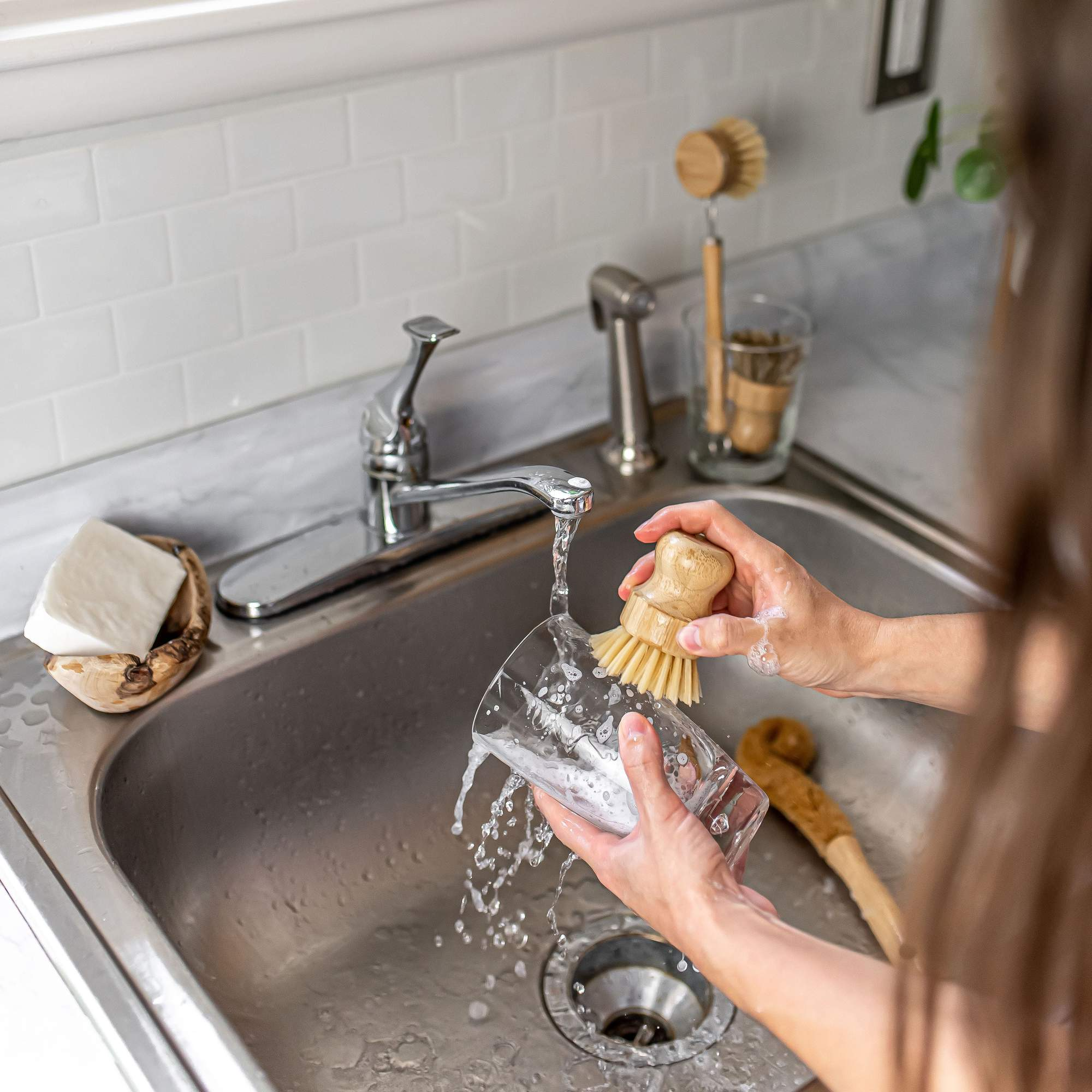Your Journey to Zero-Waste Living
You want to learn how to get started with zero-waste living, but you’re on a tight budget. We get it. We’re a small business, so we often operate on small margins too.
The first thing we want to say is: thank you for caring. We love the planet, so we’re happy to hear you feel the same.
The second thing we want to say is: we have good news. You don’t need a lot of money to reduce waste in your life. We’re going to show you how to live more sustainably even on a limited budget. With a little time, focus, and a few easy swaps, you can make a big impact.
Explaining a Zero-Waste Lifestyle
Once you mention your plans to go zero waste, you’ll probably hear lots of questions, like:
- What is zero waste?
- Is it the same as sustainable or eco-friendly?
- Why does it matter what one person does?
- Is living zero waste even possible?
Don’t worry. We’ve heard all those questions too. Here’s a bit more information to help you answer your curious friends. .
Zero-Waste Living in a Nutshell
In essence, it’s all about reducing waste in our lives. One focus is to cut down on what we send to the landfill, but there’s more to it than that.
Zero-waste living means rethinking the way we view consumption. It means breaking out of the modern cycle of buying, using, and throwing things away. Instead, we focus on consciously using and reusing resources.
Living a zero-waste lifestyle is more sustainable — it’s easier on the planet and reduces our impact on the environment. And while living 100% zero-waste is a lofty goal, every small effort makes an impact.
3 Common Myths About Zero-Waste Living… and A Surprising Truth
While you’re fielding questions from your friends, you might also hear some objections. Most of them come back to these three myths about living zero-waste.
Myth 1: Zero Waste Living is Expensive
Like we’ll show you in this guide, going zero-waste on a budget is totally possible. In fact, some of the most impactful changes cost you nothing at all.
Myth 2: Sustainable Living Doesn’t Matter Unless You’re Perfect
It’s easy to feel like a drop in the ocean when you’re trying to live sustainably on a budget. But your choices do make a difference. Every step you take is a step toward a better world for everyone. (And you never know who might notice and decide to follow you.
Myth 3: Going Zero Waste Takes a Ton of Time & Effort
Zero-waste living doesn’t have to mean sacrificing convenience. And simplifying some of your choices can save you time in the end.
Truth: Getting Started with Zero-Waste is Simple AND Affordable — and it’s Actually Great for Your Wallet
Good news: you don’t have to overhaul your entire home or spend a fortune to start living zero-waste. You can start from where you are right now.
A key point of the zero-waste movement is reducing consumption and focusing on sustainable products. Since you buy less, you’ll be spending less. And since these products are made to last, you’ll save in the long run.
Now that you’re equipped for conversations about your new zero-waste choices, let’s dive in. We’re passionate about this — and we can’t wait to show you how easy getting started with zero-waste really is.
How to Get Started with Living Zero-Waste on a Budget: 11 Simple Action Steps You Can Start Today

1. Set Yourself Up for Success with a Sustainable Mindset
Embrace Imperfection
Give yourself permission to be imperfect. Try to celebrate your wins (even the small ones!) and be kind when you struggle. When you let go of the need to be perfect, it’s easier to enjoy the journey.
Set Sustainable Goals
If you try to change everything at once, you’re more likely to get discouraged. Instead, set achievable goals that build on each other. Start with one thing and move to the next once you feel comfortable. This way you avoid burnout and can make changes that last.
Focus on What You Can Do
Everyone is different, so no two zero-waste journeys will look the same. Don’t get too bogged down by what you can’t do — and focus instead on what you can do. :)
2. Consider Your Own Big Picture
Because everyone is unique, your starting point is unique too. Take a step back and consider your life in big-picture form. Two important questions to keep in mind are:
- What are you already doing well?
- Where do you most want to improve?
Once you’ve answered these questions, you’ll know where to focus.
3. Remember the 5 R’s
The 5 R’s are the “backbone” of zero-waste living. We’ll show you how to apply them throughout this guide, but here’s a quick rundown of each:
- Refuse things that conflict with your goals when possible.
- Reduce what you choose to buy, especially if it will have to go to the landfill.
- Reuse before discarding or buying new.
- Recycle materials whenever you can.
- Rot and give back to the Earth by composting
4. Cut Down on Plastic Waste
Bring Your Own Bottles & Bags
Ditching plastic bags and water bottles removes a huge source of waste. Americans use over 100 billion plastic bags a year, and only 1% are recycled.
Bring your own reusable bags when you shop — and don’t forget to include produce bags too.
You can also cut down on single-use plastic by bringing a refillable water bottle on the go.
Look for Minimally Packaged Products
Where possible, buy in bulk to cut down on packaging waste. You can also look for items with minimal packaging (and recyclable options). A huge plus here: you won’t have to wrestle with those impossible-to-open plastic containers!
Learn to Love Reusable Containers
Reaching for a plastic baggie is convenient — but reusable containers can be just as convenient. And since they’re reusable, they reduce waste and save you money.
Choose reusable containers for organizing, food storage, packing lunches, and more.
Swap to a Bamboo Toothbrush
Even on a budget, your toothbrush is a zero-waste swap worth making. Switching to a bamboo toothbrush doesn’t cost much and has a huge impact.
In the USA alone, over a billion toothbrushes are thrown away every year. These end up in landfill, or worse, in nature where they endanger wildlife. Sustainable bamboo toothbrushes biodegrade without harming the environment.

Choose Eco-Friendly Materials
When buying new items for your home, avoid adding more plastic whenever possible. Materials like bamboo, metal, or silicon tend to last longer and have a lower impact.
5. Make Your Kitchen More Sustainable
Reduce Food Waste
Wasted food is bad for the planet and your grocery budget. You can check out our video on reducing food waste to learn more. A few key tips are:
- Shop smart - make a list & buy what you need.
- Prep meals - we’re more likely to eat food that’s prepared.
- Use leftovers - don’t be afraid to get creative.
- Store properly - this extends the life of food.
Try Composting
Composting may sound intimidating at first, but it’s surprisingly easy. And it’s a wonderful way to cut down on waste and give back to the planet.
There are countless resources on DIY compost bins, so try a method that works for you! And you can check out these compost bins, if you're interested.
Shop Local
Locally-produced food is generally better for you and for the planet. First, buying local cuts down on transportation and packaging needs. Second, food grown locally is often fresher and contains more nutrients.
Check to see if there’s a farmer’s market or grower’s co-op in your area. Even if you live in the city, you may be surprised at what you can find.
Eat At Home
When you eat at home, you use less plastic and create less waste. And cooking for yourself is a smart move for your wallet, too.
You don’t have to be a gourmet chef to enjoy delicious meals at home. If you’re new to cooking, focus on a few staple recipes at first. You can browse some basic recipes online — or go old-school and check out a cookbook from your local library. You’ll reap the tasty rewards in no time!
Make Your Own Extras
Many of our favorite “extras” are a breeze to make at home. Try making your own salad dressing, hummus, or vegetable broth. You get a fresher taste at a fraction of the cost. And it’s a wonderful (and yummy!) way to reduce waste.
6. Embrace Eco-Friendly Cleaning
Make Your Own Cleaners
This is another easy DIY that saves you big on waste and money. Conventional cleaners often contain harmful chemicals and come in plastic bottles. Instead, whip up your own eco-friendly cleaners at home. You probably have most of the ingredients already!
Switch to Bar Soap (and Bar Shampoo!)
Natural bar soap is a perfect plastic-free swap. Our zero-waste bar soaps contain skin-loving ingredients and are 100% natural. Bar soap is more cost-effective than plastic-bottled soap — and better for the planet.
For even more impact, swap your shampoo too. Humby Organics Shampoo & Conditioner Bars smell dreamy and give you happy hair without any waste.
To get the most from your bar soaps, store them away from water. You can make an easy DIY soap holder by wrapping rubber bands around a small tin or lid. Then rest your soap on top to let it dry between uses.
7. Get More From What You Have
Learn to Mend (or Swap with Handy Friends!)
In modern times, it’s become common to throw away and replace items without a second thought. To save money and reduce your impact, try fixing things first. You could try learning to sew up tears or replace buttons.
If you’re not handy yourself, don’t hesitate to ask your handy friends. You could offer to swap skills (or share your home-baked treats) to make it a win-win.
Find Ways to Repurpose
Before buying new, consider what you already have. You’ve probably heard the old saying, “Necessity is the mother of invention.” So get creative! Finding ways to repurpose reduces your carbon footprint — and it’s a smart move for your budget.
8. Reduce Waste by Buying Secondhand
Shop Thrift Stores or Secondhand Sales
We admit it, we love thrifting. There’s definitely an art to successful thrift-store shopping, but it can pay off big time. If you’ve ever experienced the thrill of finding a $100 coat for $10, you know what we mean ;)
Share or Swap with Others
You can also connect with friends, family, or neighbors and arrange a swap. You each bring clothing, household items, or other supplies. Then everyone takes what they need. This is a fun way to connect with others and give items a second life.
9. Travel in Sustainable Style

Walk or Bike When Possible
You can lower your gas bill and your carbon footprint by traveling on your own two feet. If weather permits, biking can get you from point A to point B even faster. When the conditions are right, strap on your walking shoes and get some fresh air. :)
Combine Trips
When you need to drive, make a game plan. Combining trips helps lower emissions. It also saves you time, energy, and money. Finishing your errands and realizing you forgot something is always frustrating. So plan ahead and conquer!
Join a Carpool or Use Mass Transit
If you have friends or neighbors who work in the same area as you, consider starting a carpool. Driving with friends helps you all save time. Plus, it’s nice to catch up before and after work (and take a break from being behind the wheel).
10. Explore Resources in Your Area
Every living situation is unique. Someone in a big city will have access to resources a rural resident lacks — and the opposite is also true. Take a little time to see what’s available near you. Here are some neat resources you can try to track down:
- Bulk Stores
- Compost Centers
- Growers’ Co-Ops
- Outdoor Exercise Equipment
- Community Gardens
- And more!
And if you see a need in your area, don’t be afraid to get the ball rolling yourself. :)
11. Find a Tribe for Your Zero-Waste Journey
Team Up With Family or Friends
If you have skeptical loved ones, try using some of our talking points in the intro. Once they see your sustainable success, they may just join forces with you!
In the meantime, ask around to see if any of your family or friends have similar goals. As an old proverb says, “If you want to go fast, go alone. If you want to go far, go together.”
Join Our Facebook Group
There’s already a thriving tribe of conscious people waiting to welcome you! Our Facebook group is full of passionate, conscious people who love sharing their experiences.
We also post tips, announcements, and special deals regularly. Jumpstart your journey by joining us. You can connect with others who are trying to get started with zero-waste living on a budget. When you have a tribe, everything is easier!
Taking the Next Step to Zero-Waste Living
We hope this guide helps you feel confident, encouraged, and ready to jump in. There’s no better time to begin than today.
To help you gain momentum, we wanted to share our Zero Waste Starter Kit. This kit is carefully curated with everything you need to start out on the right foot — and we’re offering it at a 33% discount. Each of these items gives you the maximum impact at a budget-friendly price.
Take a second to join our Facebook group and introduce yourself. This will give you a built-in support system, and you may even find other members in your area!
We look forward to seeing where your journey takes you. :)
.

Jessica
Writer, baker, and lover of nature.
going zero waste at home
If you don't have time to make your own items, shop the rooms below to purchase plastic-free items so you can go sustainable in your home.

In The Kitchen
If you don't have time to make your own cleaning items, you can purchase 100% natural, chemical-free & USA-made laundry products here.

In The Bathroom
From natural deodorants to reusable razors and bamboo toothbrushes, we've got everything you need to eliminate plastic from your bathroom.

In The Garden
Grow your own herbs and tea so you don't have to buy plastic-packaged items again. And check out our range of compost bins too!



